|
|
|
Sort Order |
|
|
|
Items / Page
|
|
|
|
|
|
|
| Srl | Item |
| 1 |
ID:
109147
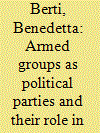

|
|
|
|
|
| Publication |
2011.
|
| Summary/Abstract |
In recent decades, armed groups have shown an increased interest in creating political parties to take part in institutional politics. By using these political wings to participate in elections and win public office, some of them have gained enormous political power. However, despite the important real-world implications of this trend, the existing literature on the topic is still underdeveloped. This article contributes to a better understanding of this subject by examining the factors that motivate armed groups to set up a political wing and compete in elections and by assessing how political participation affects an armed group's strategic outlook. The hypotheses on political wing formation and development are tested by analyzing the decision-making patterns of Hizballah. The findings suggest that the political involvement of armed groups does not follow a linear development process from armed to political organization, but instead assumes cyclical patterns: political accommodation and armed struggle are chosen in turn in response to shifts in the relation and the internal balance of power between a given group's political and armed wings.
|
|
|
|
|
|
|
|
|
|
|
|
|
|
|
|
| 2 |
ID:
127885
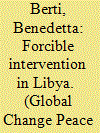

|
|
|
|
|
| Publication |
2014.
|
| Summary/Abstract |
Following the end of NATO 'Operation Unified Protector' in Libya there has been an intense debate in the international community with respect to the impact of the military engagement on both the emerging 'responsibility to protect' (R2P) norm as well as on the international community's commitment to enforce it. The study examines the impact of the international military intervention in Libya on this debate by looking at whether Operation Unified Protector contributed to strengthening or weakening the development of R2P. To do so, it first examines whether the authorization to use force in Libya was indeed grounded on R2P, as well as whether it was perceived as such by the international community. Secondly, the research examines whether the intervening parties' actual use of force was consistent with R2P. Finally, the research provides an assessment of the current state of R2P post-Libya.
|
|
|
|
|
|
|
|
|
|
|
|
|
|
|
|
| 3 |
ID:
189342
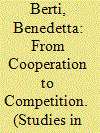

|
|
|
|
|
| Summary/Abstract |
The article explores the complex interaction between war-dynamics and non-state armed groups’ approaches to governance and politics at the local, sub-national level. It focuses on understanding how broader conflict trends influence rebel groups’ choices with respect to establishing local governance partnerships, both with civilian agents and other armed factions. The study examines this question through the lens of the Syrian landscape and through an overview of local governance arrangements by Jabhat al-NusraFootnote1 in the Idlib and Aleppo provinces between 2012 and 2017. In tracing the evolution of rebel co-governance arrangements at the local level,Footnote2 the article highlights two dynamics: first, how the breakdown of centralized governance and the gradual processed of militarization of local authorityFootnote3 altered the balance between civilian and armed actors, shifting power in the hands of the latter. Second, how the combination of prolonged strategic stalemate, resource scarcity and ideological competition between armed factions resulted in a shift from cooperative to competitive rebel governance. The article seeks to further nuance the study of rebel governance and rebel-to-political transitions by focusing on how multi-level relationships affect armed groups’ governance choices.Footnote4
|
|
|
|
|
|
|
|
|
|
|
|
|
|
|
|
| 4 |
ID:
118316
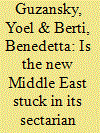

|
|
|
|
|
| Publication |
2013.
|
| Summary/Abstract |
This article focuses on the impact of the Arab Spring on pre-existing societal cleavages, specifically analyzing its impact on Sunni-Shiite relations. How have Sunni-Shiite relationships been reshaped by the ongoing social protests? Is there a rise in the inter-religious tensions among Sunni and Shiite communities across the region? And, if that is the case, what are the implications of this trend on both the region's potential for democratization, as well as on its overall stability and security?
|
|
|
|
|
|
|
|
|
|
|
|
|
|
|
|
| 5 |
ID:
186967
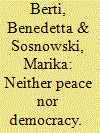

|
|
|
|
|
| Summary/Abstract |
This article examines the role of siege warfare and population control in the coercive counterinsurgency strategy used by the Syrian regime of Bashar al-Assad to effectively crush the revolution that began in 2011. We extend the coercive counterinsurgency framework offered by Monica Duffy Toft and Yuri Zhukov to analyze the Syrian regime’s use of the twin tactical pillars of siege warfare and population control. We focus on how these two types of denial – military and political – proved essential to the regime’s military victory.
|
|
|
|
|
|
|
|
|
|
|
|
|
|
|
|
| 6 |
ID:
136426
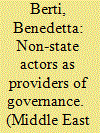

|
|
|
|
|
| Summary/Abstract |
The article tracks Hamas's political evolution by analyzing its governance record, as well as its political, economic, and social policies as the effective government in the Gaza Strip between 2007 and 2013. By providing a specific snapshot in time, the study focuses on understanding Hamas's approach to governance, as well as how the group has been able to function as a “rebel government” since taking over the Gaza Strip. The article also highlights the complex interactions between Hamas the political party, Hamas the effective government, and Hamas the non-state armed group.
|
|
|
|
|
|
|
|
|
|
|
|
|
|
|
|
| 7 |
ID:
147185
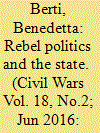

|
|
|
| 8 |
ID:
162745
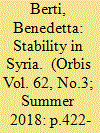

|
|
|
|
|
| Summary/Abstract |
The Syrian Civil War has taken a devastating toll on the country's civilian infrastructure and population. Tackling the legacy of the conflict and restoring a measure of stability will constitute a monumental and generational challenge. The article addresses the “day after” in Syria by mapping out the main issues that a future post-conflict recovery, reconstruction, and reconciliation process would need to address in order to attain some level of stability and to be sustainable. It then describes and analyzes one of the most complex challenges of a future post-war transition, namely the need to reign in the proliferation of non-state armed groups and to ensure a process of disarmament, demobilization, and reintegration (DDR) of former combatants, including those hailing from the jihadi camp. Finally, the article briefly addresses the role that local actors can play in beginning to build stability.
|
|
|
|
|
|
|
|
|
|
|
|
|
|
|
|
| 9 |
ID:
194001


|
|
|
|
|
| Summary/Abstract |
Authoritarian, revisionist, and revanchist powers are exerting pressure on the liberal international order and challenging the United States’ vital security interests across theaters. The United States will increasingly need to simultaneously tackle challenges in two critical theaters while also addressing global threats. To do so effectively, it will need to lean in and actively capitalize on its chief geostrategic advantage over its competitors and adversaries – its global network of alliances and strategic partnerships. However, alliance management faces both traditional and emerging challenges. These range from ensuring effective burden sharing, to providing alliance assurance and balancing interests and values along with allies’ contributions across theaters and domains. In addition, because the United States is operating in a world where all instruments of power, military and non-military, are increasingly utilized in an interconnected way, it will also need to look at defense and security alliance management through the lens of issues ranging from industrial policy to economic security. This essay sheds light on these “old” and “new” challenges, providing insights into critical issues of alliance management that the United States will face in the emerging security environment.
|
|
|
|
|
|
|
|
|
|
|
|
|
|
|
|
| 10 |
ID:
188093
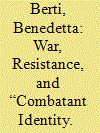

|
|
|
|
|
| Summary/Abstract |
A key issue in analyzing how armed conflict shapes postwar politics pertains to the question of how rebel groups frame their wartime “combatant identity” in the context of their postwar political activism. As armed political organizations active in the midst of conflict, rebel groups’ identities often encompass a “combatant identity” and and what Canetti et al. have described as an “ethos of conflict,” centered on the legitimacy of the use of force, the rightfulness of the rebels’ goals and the defensive nature of their struggle, along with a narrative of victimization and patriotism. How does this identity crystallized in wartime shape political behavior in the aftermath of hostilities or after a political settlement has been reached? How is this combatant identity embedded, reframed and adapted to fit into a broader postwar political narrative? The article explores this question by analyzing the case of Hezbollah’s political and militant identity in the aftermath of the Lebanese civil war; underlying the group’s political, military and social orientation and contextualizing it as operating in a liminal, no-war, no-peace context defined by both the end of the internal civil war and the continuation of the open conflict with Israel. Hezbollah offers an interesting case to examine the resilience of the combatant framework during and in the aftermath of conflict. The article traces the evolution of Hezbollah’s combatant identity from the Lebanese civil war, through its post-agreement political transition, until the group’s involvement in the Syrian conflict. In doing so, it underlines how the group’s combatant identity remained resilient while also being fungible, allowing Hezbollah to preserve core ideological beliefs while shifting its discourse based on political expediency.
|
|
|
|
|
|
|
|
|
|
|
|
|
|
|
|
|
|
|
|
|